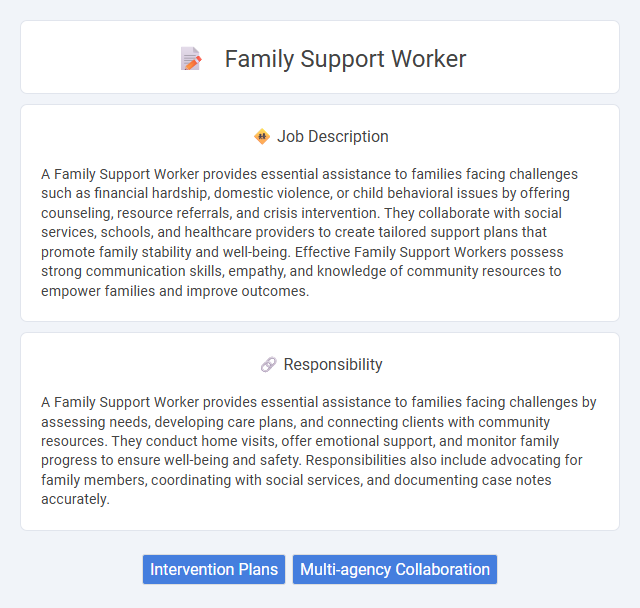
A Family Support Worker provides essential assistance to families facing challenges such as financial hardship, domestic violence, or child behavioral issues by offering counseling, resource referrals, and crisis intervention. They collaborate with social services, schools, and healthcare providers to create tailored support plans that promote family stability and well-being. Effective Family Support Workers possess strong communication skills, empathy, and knowledge of community resources to empower families and improve outcomes.
Individuals who are empathetic, patient, and possess strong communication skills are likely to be well-suited for a Family Support Worker role. Those experiencing high levels of stress or emotional instability may find the demands of supporting vulnerable families challenging. Candidates with a stable emotional foundation and a genuine desire to assist others probably will thrive in this position.
Qualification
A Family Support Worker typically requires a minimum of a high school diploma, with many employers preferring candidates who hold a degree in social work, psychology, or a related field. Essential qualifications include strong interpersonal skills, knowledge of community resources, and experience working with children and families facing challenges such as domestic violence, mental health issues, or poverty. Certification or training in crisis intervention, child development, and case management enhances employability and effectiveness in providing comprehensive family support services.
Responsibility
A Family Support Worker provides essential assistance to families facing challenges by assessing needs, developing care plans, and connecting clients with community resources. They conduct home visits, offer emotional support, and monitor family progress to ensure well-being and safety. Responsibilities also include advocating for family members, coordinating with social services, and documenting case notes accurately.
Benefit
Family Support Worker roles likely offer significant benefits such as providing emotional and practical assistance to families in need, which can improve family dynamics and child well-being. These positions may also offer a sense of personal fulfillment and the opportunity to impact community health positively. Employees in this role probably gain valuable skills in communication, crisis intervention, and case management.
Challenge
Working as a Family Support Worker likely involves navigating complex emotional and social challenges while addressing diverse family dynamics. The probability of encountering stressful situations is high, requiring resilience and strong problem-solving skills. Managing limited resources and coordinating with multiple agencies may also pose significant difficulties in achieving positive outcomes for families.
Career Advancement
A Family Support Worker plays a crucial role in providing resources and guidance to families, fostering resilience and stability. Advancing in this career often involves acquiring specialized certifications, such as trauma-informed care or counseling, which enhance expertise and open pathways to supervisory or management positions. Pursuing higher education in social work or related fields significantly boosts opportunities for leadership roles and increased responsibilities within community organizations.
Key Terms
Intervention Plans
Family Support Workers develop targeted intervention plans to address the specific needs of children and families facing challenges such as abuse, neglect, or behavioral issues. These plans incorporate evidence-based strategies to promote safety, stability, and emotional well-being, ensuring tailored support that fosters resilience and positive family dynamics. Regular evaluation of intervention outcomes allows for adjustments and collaboration with multidisciplinary teams, maximizing the effectiveness of support services.
Multi-agency Collaboration
Family Support Workers play a vital role in multi-agency collaboration by coordinating services among social workers, healthcare providers, schools, and community organizations to ensure comprehensive care for families. Their expertise in communication and resource navigation enables the seamless integration of support plans tailored to individual family needs. Effective multi-agency collaboration enhances outcomes by addressing complex social, emotional, and economic challenges through a unified support network.
 kuljobs.com
kuljobs.com